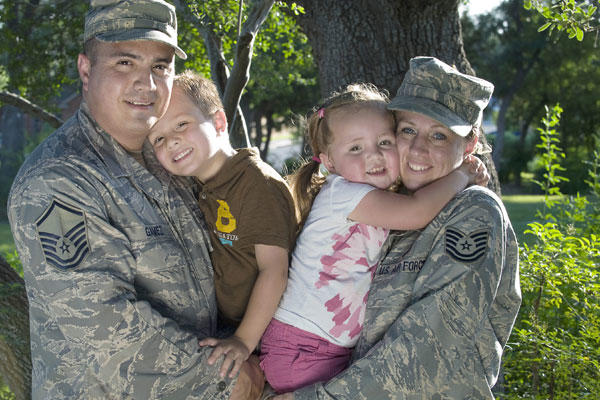The U.S. Air Force plans to start allowing some airmen this year to take three years of family leave as part of a pilot program designed to boost retention, according to the service's head of personnel.
Lt. Gen. Samuel Cox, the Air Force's deputy chief of staff for manpower, personnel and services, announced the policy on Thursday during a breakfast hosted by the Air Force Association.
"Some women ... leave the Air Force because they want to start a family," Cox said. "So why don't we have a program that allows them, in some cases, to be able to separate from the Air Force for a short period of time, get the family started, then come back in?"
The military is grappling with how to retain high-quality, career-oriented service members despite having to downsize due in part to automatic budget cuts known as sequestration and an end of the U.S.-led wars in Iraq and Afghanistan during the past decade.
The Air Force in its fiscal 2015 budget proposal requested funding for a total of 483,000 airmen, including 310,900 in the active component, 105,000 in the Air National Guard and 67,100 in the reserve. That's down 3 percent from this year. The service is planning for the active-duty force to shrink even more, to 308,800 airmen.
Poll: Would You Take a Military Career Sabbatical?
The Air Force's family leave initiative is similar to a Navy effort already underway, called the Career Intermission Program, which allows 20 officers and 20 enlisted personnel a year to transfer from active duty to the reserves for as many as three years while retaining health care coverage.
Cox said the pilot program will still allow airmen to stay competitive for promotions.
"Their year group is completely reset, so if you leave as a 2000 year group, you come back as a 2003 year group," he said. "That allows you to continue to build the same portfolio that makes you competitive on upward movement."
He said the program has already received approval from senior leadership and a selection board will convene later this year to identify the first entrants. A date hasn't been set.
"It's going to be a selective board," Cox said. "We want people that have high potential that can go and do that program."
Responses from airmen and spouses were mixed.
Michelle Doolittle, who recently enlisted in the Air Force, said she would potentially be interested in applying for extended family leave in part because she plans to stay in the service for 20 years. "It would depend on my spouse and his occupation," she said.
Adrianna Domingos-Luphner, whose husband is an Air Force officer with 10 years of experience, said the program sounded like a poor excuse "for not providing real maternity/paternity leave policies that work for both men and women." She also speculated that some women who try to take advantage of it will still be penalized when it comes time for promotion.
"Taking three years out of service to be three years behind your peers and then owe 6 years back per the Navy program and that time doesn't really count towards retirement?" Domingos-Luphner asked. "Let's just get a real policy together that isn't specific to the military. Overhaul paternity and maternity leave policies at the national policy level and then get on with life as usual."
-- Brendan McGarry can be reached at brendan.mcgarry@monster.com
-- Amy Bushatz can be reached at amy.bushatz@monster.com





























